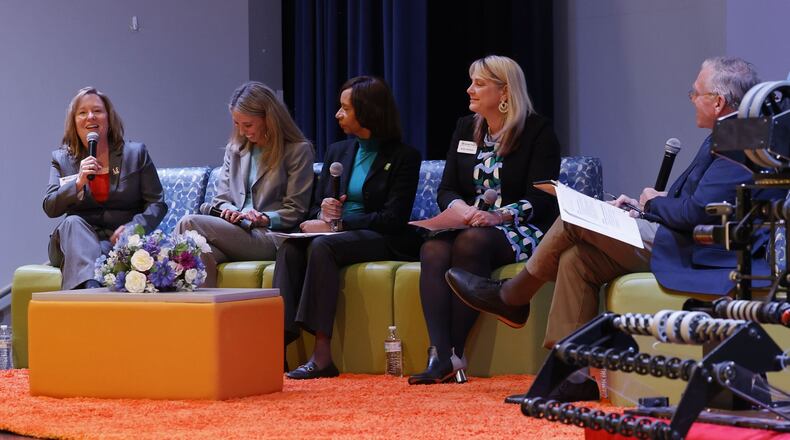Overall, a common theme emerged of recent and greater cooperation between Miami University, Butler Tech, Lakota Schools and Cincinnati State Technical and Community College and their shared goal of expanding student opportunities in Butler County.
From Lakota K-12 to career learning to college instruction at Miami’s regional campuses in Hamilton and Middletown, which now includes a campus branch of Cincinnati State, the increasingly joint efforts of strengthening the region’s quality of life through building strong career options was echoed by each speaker.
“We are seeing more students from Butler County,” said Cincinnati State President Monica Posey, whose school’s main campus is in Cincinnati. “Our presence on Miami’s (Middletown) campus is great for us.”
Posey told the audience four years ago, Cincinnati State’s percentage of students from Butler County was 11% of its total enrollment and now is 27%.
Whitely, who oversees Butler County’s largest school system, said Lakota is increasingly partnering with Butler Tech’s many high school career training programs while also furthering its cooperation with Miami’s regional and main campus programs.
She said Lakota’s plans to replace and update its aging learning spaces through sweeping a facilities plan also includes enhancing its learning technology.
“We have to make sure we are future ready now from our curriculum aspect also in our facilities. We heard very strongly from our community that (learning technology) is certainly a narrative they want to explore in our new facilities. And when students go off into the workforce or off to college, they have those (technology) experiences.”
Moira Casey, regional senior associate dean of academic affairs Miami regionals, said building student post-graduation career skills continues to be a main focus.
“At Miami we do a number of things to help prepare students for that transition from college to the workforce. We have a very robust career services office … and we offer internships, co-ops (learning) and we are really working with students all throughout their academic career to make sure they are working toward professionalization and getting those professional skills they are going to need in the workplace,” said Casey.
Marni Durham, assistant superintendent of Butler Tech, said “our commitment is reaching the greatest number of students.”
In recent years Butler Tech’s county-wide high school and adult career training programs have seen its total enrollment grow to more than 18,000 students served daily, but Durham said there is need for more growth of the career school’s programs.
“We still have waiting lists (for enrollment) and that is very frustrating to us that a student in a public-school situation wants that Butler Tech experience but they are not able to get that.”
About the Author
